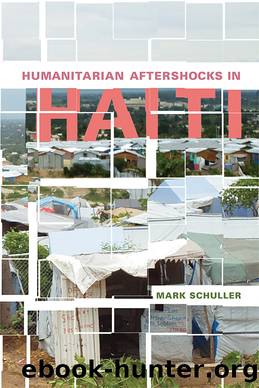Humanitarian Aftershocks in Haiti by Mark Schuller

Author:Mark Schuller [Schuller, Mark]
Language: eng
Format: epub
Tags: History, Caribbean & West Indies, General, Nature, Earthquakes & Volcanoes, Political Science, NGOs (Non-Governmental Organizations), Political Ideologies, Conservatism & Liberalism, Corruption & Misconduct, Social Science, Anthropology, Cultural & Social, Sociology, Disasters & Disaster Relief
ISBN: 9780813574264
Google: 5mcuCwAAQBAJ
Publisher: Rutgers University Press
Published: 2016-01-12T04:25:13+00:00
Conclusion
A Jain parable discusses six blind men each touching different parts of an elephant and drawing different conclusions about what an elephant is. In much the same way, the IDP population canât be expected to see the whole functioning system of international humanitarian aid. They critique what they can see. The Nan Bannann and Hancho committee members have their hands on another piece of the elephant, and it raises new sets of questions.
In such a complex, multifaceted, and large-scale set of phenomena, completely controlling for and isolating variables is not possible, nor, I argue, desirable. However, this chapter has revealed some interesting correlations that demand attention. Karadeâs Central Committee, created by an NGO, became autocratic and corrupt when they were able to leverage more material aid for the population (the St. Louis Displaced). NGO-managed camps had worse governance and civil society indicators than those without. In the 108-camp survey in 2010, people in NGO-managed camps were slightly less informed about the name of the camp committee (27 percent, compared to 35 percent), less aware of the committeeâs plan (25 percent, compared to 35 percent), and less familiar with the committee leadership (50.5 percent, compared to 69.0 percent) than those in camps not managed by NGOs. Most interesting, only 39.8 percent of people in NGO-managed camps felt they could participate in the committeeâs activities, whereas 57.5 percent of those in camps without an NGO management agency felt they could participate.
Although it may be uncomfortable to acknowledge, the patterns in even the qualitative data are hard to ignore. The worst abusers of their power were directly chosen by NGOs. The heavier the hand played by NGOs in the creation of the camp committee, the more likely the committee was to exclude the population. Understanding this also sheds light on the original question, What happened to the outpouring of bottom-up solidarity immediately following the earthquake? From kotizasyon (each making a contribution) to pòch prela (pockets of tarps), from youn ede lòt (one helping the other) to chen manje chen (dog eat dog), the ways in which committees were implanted, imposed by NGOs for the receipt of life-sustaining aid, had the consequence of systematically replacing horizontal, bottom-up forms of solidarity with top-down, hierarchical, bureaucratic intermediaries. Anthropologists used to discuss the concept of âsegmentarity,â or the ability of a family unit to split off and reproduce the exact structure, a concept revived as âfractalsâ or rhizomes (Deleuze and Guattari 1987).
Intended or not, like Dr. Frankenstein, NGOs created the very monsters that haunted them in the end. Mary Shelleyâs parable was a warning against the potential abuses of unbridled technology. Translated to the context of the camp, it is a warning that human relationships donât easily conform to quick, technocratic solutions. Seen from this albeit unflattering portrait painted by recipients, call them camp residents or IDPs, camp committees are best described as âgenetically modifiedâ organizations. In some cases, like CAJIT, the intervention is slight; in others, like Karade or Plas Lapè they were outright creations of aid agencies.
Download
This site does not store any files on its server. We only index and link to content provided by other sites. Please contact the content providers to delete copyright contents if any and email us, we'll remove relevant links or contents immediately.
The Secret History by Donna Tartt(19027)
The Social Justice Warrior Handbook by Lisa De Pasquale(12182)
Thirteen Reasons Why by Jay Asher(8883)
This Is How You Lose Her by Junot Diaz(6872)
Weapons of Math Destruction by Cathy O'Neil(6260)
Zero to One by Peter Thiel(5782)
Beartown by Fredrik Backman(5734)
The Myth of the Strong Leader by Archie Brown(5491)
The Fire Next Time by James Baldwin(5423)
How Democracies Die by Steven Levitsky & Daniel Ziblatt(5211)
Promise Me, Dad by Joe Biden(5139)
Stone's Rules by Roger Stone(5078)
A Higher Loyalty: Truth, Lies, and Leadership by James Comey(4946)
100 Deadly Skills by Clint Emerson(4911)
Rise and Kill First by Ronen Bergman(4775)
Secrecy World by Jake Bernstein(4738)
The David Icke Guide to the Global Conspiracy (and how to end it) by David Icke(4696)
The Farm by Tom Rob Smith(4500)
The Doomsday Machine by Daniel Ellsberg(4481)
